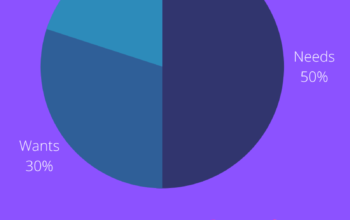Are You Making These ‘5 Worst Money Mistakes’?
Hello everyone! If you’re new to my blog, thanks so much for reading. If you’ve read a blog post before, welcome back! I love to read articles about people’s money habits, living abroad on less than $2,000 USD per month and stories about people’s journey towards financial independence. I define financial independence as having enough assets (stocks, bonds, cash, real estate, etc.) to be able to pay for your life without having to actively ‘work’ ever again.
However, for most Americans, financial independence might not ever be a possibility or a goal at all. It’s not easy, not everyone has the same opportunities in life, and some people genuinely LOVE to work (crazy right?). I recently came across an article from CNBC titled “Experts agree: these are the 5 worst money mistakes you may be making” and wanted to over them with you all and see if I agree with the experts.
- Not Having an Emergency Fund
I agree with the experts on this one. Having an emergency fund has always been essential and some people may have gotten away with not having one until 2020. The coronavirus not only created a medical pandemic, but it also shattered a lot of economies around the world and left many people jobless for the foreseeable future.
When you don’t have money stashed away for these types of situations, you can be forced to survive on credit cards or high interest personal loans which can put you in an even more precarious money situation. You want to avoid this as much as possible. The experts suggest “starting small” with as little as $25 a week, or even $1,000 to take away some pressures and get you started on the path to building a robust emergency fund when you are able to.
2. Paying Off the Wrong Debt First
Most Americans that have any type of debt don’t just have one type of debt, they have credit card debt, student loans, a house mortgage, and a car payment. So what happens when you have an extra chunk of money that you want to use to pay down some of your debt? Which debt do you attack first?
The experts in the article suggest putting that extra money towards paying off debt that has an interest rate higher than 3% which usually will mean paying off the credit card debt first. I also agree with the experts here. Any debt that I have that has an interest rate of 4% or less, I pay off at a much slower rate. However, I paid off all of my credit cards and now when I use my Chase Sapphire Preferred card, I pay off my monthly statement balance because the interest rate is about 20%. I don’t have a mortgage at this time, but if I ever do in the future, I won’t be in a big rush to pay it off quickly. I’d rather take that extra money and invest it than pay off a loan with a lower interest rate.
3. Missing out on employer matching contributions
Not everyone’s employer gives them access to a 401k retirement fund that matches their savings. However, if your employer does, take advantage of it! My employer doesn’t offer a match, so I don’t even bother to contribute to it. My husband’s employer offers a match, so he takes advantage of it happily.
The experts describe not taking advantage of a 401k match as “leaving that free money on the table” which I also agree with. But, keep in mind that if you plan on retiring early, you won’t be able to take out the money penalty-free until you are 59 and a half years old.
4. Not having credit monitoring or an alert service set up
Nothing is worse than finding a false report on your credit report. Or, let me take that back. Nothing is worse than finding out that someone has stolen your identity and taken out a credit card or a loan in your name. You wouldn’t want to learn this when you are about to purchase a new car or get a mortgage for your dream house. The experts suggest taking advantage of free ways to monitor your credit. I personally use Credit Karma and Discover.com that let you monitor your credit and get an email alert if any new loan has been opened in your name.
5. Allowing ‘lifestyle creep’ to occur
This last point might be the most insidious of them all. In my opinion, part of the American dream is to strive to earn more money, increase your social status, and buy items that show that you have ‘made it’. It’s perfectly okay to upgrade your standing of living within reason. If you’ve grown up in poverty, and lived in neighborhoods that didn’t make you feel safe and didn’t have access to fresh food, parks, or employment opportunities…you should definitely move!
The lifestyle creep that the experts describe is the kind that occurs when you start to spend more money everytime you get a raise. The experts refer to it as “lifestyle drift” which can lead to senseless overspending. A great way to avoid this is to have a plan for your raises, bonuses, or commissions. If you have a solid plan for the money, such as saving for a downpayment on a house or paying off debt, you’re much less likely to use that extra money on a new car or a designer bag.
In conclusion…
This is one of the few articles about money and Americans habits around money that I almost completely agree with. What do you think about the worst money mistakes that they listed?



